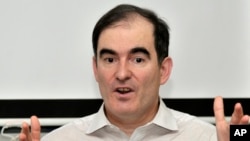BANGUI —
The United Nations says farmers in the Central African Republic need seeds and tools before the next planting season if they are to stave off a nationwide food crisis.
Two senior UN officials were in Bangui this week: John Ging, operations director of the U.N. Office for the Coordination of Humanitarian Affairs (OCHA), and Dominique Burgeon, emergencies director for the Food and Agriculture Organization (FAO).
Speaking at a news conference, Ging told reporters the international community must help Central Africans displaced by conflict to plant enough food for the next harvest - and the next planting season starts in March.
"The most urgent needs are exactly what you would expect - assistance with the seeds and tools for helping themselves to recover their livelihoods. We’ve got to focus on helping people to help themselves," he said.
The United Nations estimates that 886,000 people are displaced by conflict within CAR, most of them since September. It says that not enough land was planted because of the turmoil in the country throughout last year. Food stocks are now very low and there is a shortage of seeds.
A complete breakdown in law and order last year meant that in many areas seed stocks, tools, livestock, and virtually everything else was stolen by bandits and entire villages were burned to the ground.
Human Rights Watch reports that the Seleka rebels who took power last March pillaged many areas even after their leader Michel Djotodia had become president.
The Food and Agriculture Organization says more than one million people in this country of about 4.5 million have no reliable food supply.
Ging called for more aid organizations to come to the Central African Republic quickly to lend their expertise and experience.
"We need more of the large international non-governmental organizations [NGOs] to come here - urgently" he said. "If you go to any of the countries where we have very large humanitarian operations, you will see all of the big international non-governmental organizations present in those countries. Many of those large international organizations are not present in this country."
Ging also appealed for more funding to meet CAR's needs. So far, he said, only $30 million had been received in response to an appeal for $247 million, and those needs are increasing.
Two senior UN officials were in Bangui this week: John Ging, operations director of the U.N. Office for the Coordination of Humanitarian Affairs (OCHA), and Dominique Burgeon, emergencies director for the Food and Agriculture Organization (FAO).
Speaking at a news conference, Ging told reporters the international community must help Central Africans displaced by conflict to plant enough food for the next harvest - and the next planting season starts in March.
"The most urgent needs are exactly what you would expect - assistance with the seeds and tools for helping themselves to recover their livelihoods. We’ve got to focus on helping people to help themselves," he said.
The United Nations estimates that 886,000 people are displaced by conflict within CAR, most of them since September. It says that not enough land was planted because of the turmoil in the country throughout last year. Food stocks are now very low and there is a shortage of seeds.
A complete breakdown in law and order last year meant that in many areas seed stocks, tools, livestock, and virtually everything else was stolen by bandits and entire villages were burned to the ground.
Human Rights Watch reports that the Seleka rebels who took power last March pillaged many areas even after their leader Michel Djotodia had become president.
The Food and Agriculture Organization says more than one million people in this country of about 4.5 million have no reliable food supply.
Ging called for more aid organizations to come to the Central African Republic quickly to lend their expertise and experience.
"We need more of the large international non-governmental organizations [NGOs] to come here - urgently" he said. "If you go to any of the countries where we have very large humanitarian operations, you will see all of the big international non-governmental organizations present in those countries. Many of those large international organizations are not present in this country."
Ging also appealed for more funding to meet CAR's needs. So far, he said, only $30 million had been received in response to an appeal for $247 million, and those needs are increasing.




